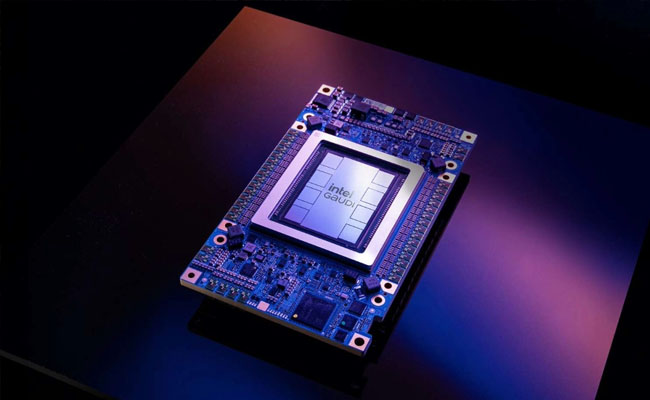Intel unveils new AI accelerator chip in bid to take on Nvidia
By MYBRANDBOOK

With an aim to challenge Nvidia Corp., Intel is rolling out a new version of its artificial intelligence chip. The updated processor, called Gaudi 3, is designed to boost performance in two key areas: helping train AI systems — a process that involves bombarding them with data — and running the finished software.
Notably, earlier versions of Gaudi failed to achieve the market share gains that Intel had been hoping for.
“Innovation is advancing at an unprecedented pace, all enabled by silicon – and every company is quickly becoming an AI company,” said Intel CEO Pat Gelsinger. “Intel is bringing AI everywhere across the enterprise, from the PC to the data center to the edge. Our latest Gaudi, Xeon and Core Ultra platforms are delivering a cohesive set of flexible solutions tailored to meet the changing needs of our customers and partners and capitalize on the immense opportunities ahead.”
Enterprises are looking to scale GenAI from pilot to production. To do so, they need readily available solutions, built on performance and cost- and energy-efficient processors like the Intel Gaudi 3 AI accelerator, that also address complexity, fragmentation, data security and compliance requirements.
The Intel Gaudi 3 AI accelerator will power AI systems with up to tens of thousands of accelerators connected through the common standard of Ethernet. Intel Gaudi 3 promises 4x more AI compute for BF16 and a 1.5x increase in memory bandwidth over its predecessor. The accelerator will deliver a significant leap in AI training and inference for global enterprises looking to deploy GenAI at scale. In comparison to Nvidia H100, Intel Gaudi 3 is projected to deliver 50% faster time-to-train on average3 across Llama2 models with 7B and 13B parameters, and GPT-3 175B parameter model.
Additionally, Intel Gaudi 3 accelerator inference throughput is projected to outperform the H100 by 50% on average1 and 40% for inference power-efficiency averaged2 across Llama 7B and 70B parameters, and Falcon 180B parameter models.
Intel Gaudi 3 provides open, community-based software and industry-standard Ethernet networking. And it allows enterprises to scale flexibly from a single node to clusters, super-clusters and mega-clusters with thousands of nodes, supporting inference, fine-tuning and training at the largest scale. Intel Gaudi 3 will be available to OEMs – including Dell Technologies, HPE, Lenovo and Supermicro – in the second quarter of 2024.
Intel shared broad momentum with enterprise customers and partners across industries to deploy Intel Gaudi accelerator solutions for new and innovative generative AI applications:
Bharti Airtel: Embracing the power of Intel’s cutting-edge technology, Airtel plans to leverage its rich telecom data to enhance its AI capabilities and turbo charge the experiences of its customers. The deployments will be in line with Airtel’s commitment to stay at the forefront of technological innovation and help drive new revenue streams in a rapidly evolving digital landscape.
Infosys: Global leader in next-generation digital services and consulting announced a strategic collaboration to bring Intel technologies including 4th and 5th Gen Intel Xeon processors, Intel Gaudi 2 AI accelerators and Intel Core Ultra to Infosys Topaz – an AI-first set of services, solutions and platforms that accelerate business value using generative AI technologies.
Ola/Krutrim: To pre-train and fine-tune its first India foundational model with generative capabilities in 10 languages, producing industry-leading price/performance versus market solutions. Krutrim is now pre-training a larger foundational model on an Intel Gaudi 2 cluster.
Intel also announced collaborations with Google Cloud, Thales and Cohesity to leverage Intel's confidential computing capabilities in their cloud instances. This includes Intel Trust Domain Extensions (Intel TDX), Intel Software Guard Extensions (Intel SGX) and Intel’s attestation service. Customers can run their AI models and algorithms in a trusted execution environment (TEE) and leverage Intel’s trust services for independently verifying the trust worthiness of these TEEs.


Legal Battle Over IT Act Intensifies Amid Musk’s India Plans
The outcome of the legal dispute between X Corp and the Indian government c...

Wipro inks 10-year deal with Phoenix Group's ReAssure UK worth
The agreement, executed through Wipro and its 100% subsidiary,...

Centre announces that DPDP Rules nearing Finalisation by April
The government seeks to refine the rules for robust data protection, ensuri...

Home Ministry cracks down on PoS agents in digital arrest scam
Digital arrest scams are a growing cybercrime where victims are coerced or ...


ICONS OF INDIA : RAMESH NATRAJAN
Ramesh Natarajan, CEO of Redington Limited, on overcoming ‘technolog...

ICONS OF INDIA : SACHIN BANSAL
Sachin Bansal is an Indian entrepreneur. He is best known as the found...

ICONS OF INDIA : SHAILENDER KUMAR
Shailender Kumar is senior vice president and regional managing direct...


GSTN - Goods and Services Tax Network
GSTN provides shared IT infrastructure and service to both central and...

DRDO - Defence Research and Development Organisation
DRDO responsible for the development of technology for use by the mili...

C-DAC - Centre for Development of Advanced Computing
C-DAC is uniquely positioned in the field of advanced computing...


Indian Tech Talent Excelling The Tech World - JAY CHAUDHRY, CEO – Zscaler
Jay Chaudhry, an Indian-American technology entrepreneur, is the CEO a...

Indian Tech Talent Excelling The Tech World - Aman Bhutani, CEO, GoDaddy
Aman Bhutani, the self-taught techie and CEO of GoDaddy, oversees a co...

Indian Tech Talent Excelling The Tech World - NEAL MOHAN, CEO - Youtube
Neal Mohan, the CEO of YouTube, has a bold vision for the platform’s...
 of images belongs to the respective copyright holders
of images belongs to the respective copyright holders